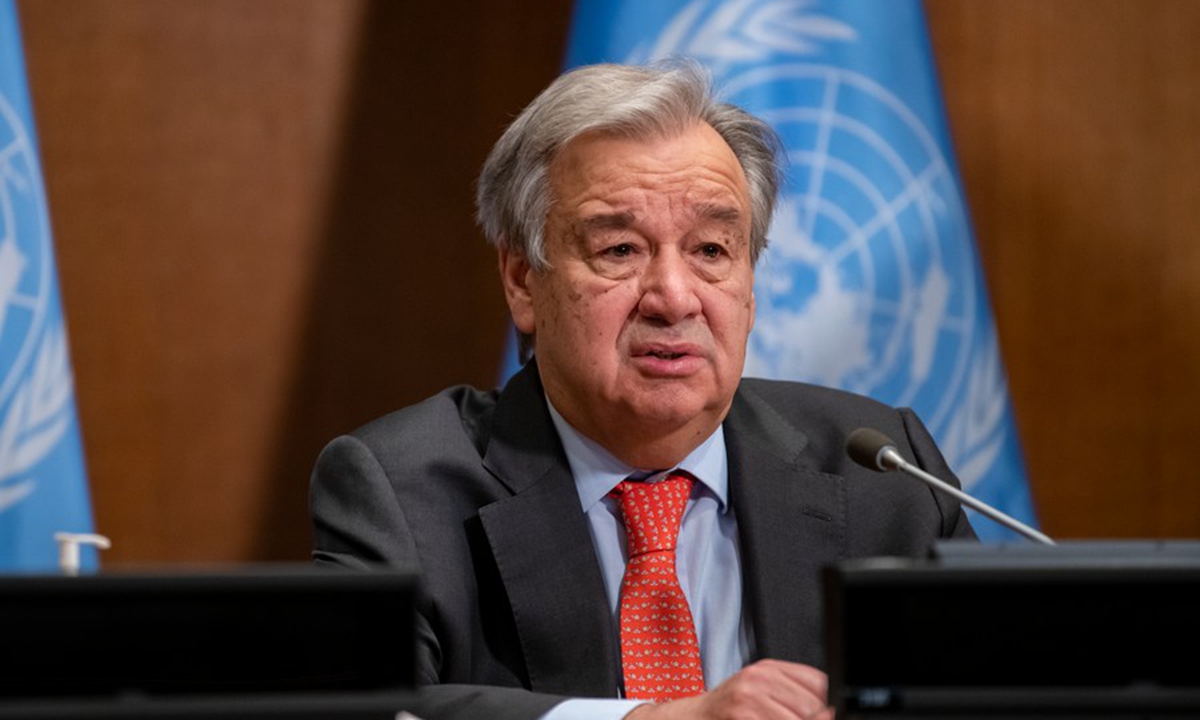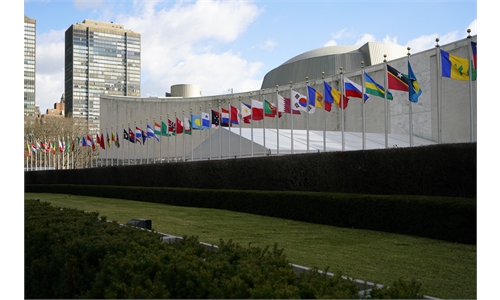US can no longer be perfunctory toward Guterres’ this appeal: Global Times editorial

United Nations Secretary-General Antonio Guterres. Photo: Xinhua
Since this year, the United Nations (UN) has repeatedly sounded the alarm on the global food crisis. UN Secretary-General Antonio Guterres on Saturday in Turkey once again underlined the unimpeded access to the global markets of Russian food and fertilizer; otherwise "there may not be enough food in 2023." This is a major appeal made by UN Secretary-General to the international community from the highest standpoint of safeguarding global common interests and preventing humanitarian crisis, which deserves positive response and strong support from all relevant countries.Guterres had clear target when he made these remarks. At present, it is no secret who is the biggest obstacle for Russia's fertilizers and agricultural products to enter the world market, and which segments they are mainly stuck in. Although the US and Western countries have not included Russian agricultural products and fertilizers on their sanctions list, Guterres made it clear that the export of these products is still affected by a "chilling effect." The reality is true that most international traders are afraid of buying for fear of US and European sanctions.
On the other hand, even though the US and the West have lifted financial restrictions on Russian grain and fertilizers, etc., the issue of freight restrictions has remained unsettled. Russian ships are barred from entering key ports in regions such as the Mediterranean, while foreign ships are also banned from traveling to Russian ports to pick up food and other goods. That means even if one dares to buy them, these goods will either be difficult to ship or bear high shipping costs.
The sanctions imposed by the US and the West against Russia have actually created a strong atmosphere of terror, and the normal and even just agricultural trade has been intensively disrupted and undermined. No matter how many high-sounding reasons the US and the West label on their sanctions, the bad consequences they have triggered are increasingly manifested. Apart from the food issue, many hegemonism and power politics practices that originate in Washington often eventually result in people's livelihood difficulties and even disasters in some developing countries. After all, it is the poor countries and the impoverished people who bear everything.
In addition, on one side, it is the scene of people in poor countries starving, but on the other side, it is the feast of Wall Street and big grain merchants. The four companies known as the four "largest grain traders" control 75 to 90 percent of the world's grain trade, and three of them are US companies. According to US media reports, high food prices have made the wealth of US grain giants soar. Among them, three more members of the Cargill family joined the Bloomberg Billionaires list of the richest 500 people alive this year, while Bunge has raised its full-year profit forecast by over 20 percent this year. For the US, which has gained ill-gotten profits by provoking wars in other countries, food has also become a bargaining chip in its game of becoming rich overnight.
In May, the United Nations Food Programme issued a warning that "mankind may face the biggest food crisis after World War II" and about 1.7 billion people will face hunger. As the negative factors such as COVID-19 continue to ferment, the current extreme drought in the northern hemisphere will cause a new blow to global food production. Compared with these uncontrollable natural disasters, opening a "green channel" for agricultural products and fertilizers exportations from Russia and Ukraine is obviously the cheapest and easiest to achieve and the effect will be instant. This is what many agricultural producing countries in Africa, Southeast Asia and South America are eagerly looking forward to.
Guterres revealed that the UN was working with the US and the EU to overcome obstacles to Russian food and fertilizers reaching world markets. As UN secretary general, that's probably all he could say. But people know in their hearts that whether the world can avoid a food crisis next year largely depends on to what extent the US and EU could cooperate with the UN's overall coordination. The international community cannot pin the hope on the US and the West that they will enhance their awareness and take the initiative to change. It needs to continuously increase public opinion and moral pressure, and urge them to seriously perform their international obligations and responsibilities.
Third world countries have long been criticizing that sanctions imposed by the US and the West on Russia have intensified the global food crisis, to which the US has made various excuses, claiming that it has "no interest in weaponizing food to create humanitarian crises at the expense of vulnerable populations." One month ago, the US hypocritically put on a show to buy Russian fertilizers. But since the UN secretary general still has to worry about the issue, which demonstrates that the problem has not been solved and also shows that the US lacks sincerity and executing capability.
August 19 marks the World Humanitarian Day, and Guterres also made a special appeal to rich countries in hope they can open their wallets and hearts to help those bearing the brunt of the global food crisis. Next, we will see what actual actions these countries will take. The international community has sharp eyes.


